- Home
- Joseph Bruchac
Talking Leaves Page 5
Talking Leaves Read online
Page 5
I nod. “How did you know?”
“I heard of his passing,” my father says, his voice almost a whisper, meant for my ears alone. “Red Bird was my friend, you know. We grew up together. Although I could not be there with you, I knew that he would teach you well. No boy could have had a finer uncle.”
I’m not sure what to say. My father’s sympathy has touched me so deeply that I feel a lump in my throat. Then a little voice from inside the cabin speaks up.
“Would you tell that story about the seven boys, Edoda? Please, Father, please!”
CHAPTER 7
The Chunkey Players
Of course it is Ahyokah. My father knew she was there listening just as well as I did. He, too, probably heard her open the door just a crack behind us soon after we sat down. That is why he lowered his voice to whisper those words about Red Bird to me. Though he is growing older, it seems as if his senses have not become dulled.
He looks over at me and shakes his head. “You see how it is around here,” he says. “I can never say anything without your little sister hearing it. Even if there is nothing worth hearing from my old mouth.”
Ahyokah pushes her way out through the door, walks straight over to our father, and plops herself down at his feet.
“That is NOT so!”
“Must I tell that story? Even if I cannot tell it well?”
“Yes, you must! You are a great storyteller, Father.”
I am both pleased and irritated right now. I’m pleased that my father may be about to tell another story. But I am irritated that my little sister has thrust herself right into the middle of this special time I was having with him. She has him every day when he is at home. She also has been with him in the western lands. Over the last three years, from what everyone says, she and her mother have often traveled west to see him, spending weeks and weeks at a time in his company while Sally’s two brothers took care of her farm and house. This is the first time I’ve been with my father in so long. It should be my time with him, not hers. Doesn’t she understand that?
But of course she doesn’t. She may be bright, but she is just a little girl. And because she seems to like everyone—including the grumpy big brother who just walked into her life—she probably can’t even imagine how jealous I am feeling about her. She is such a likable child. If she were anyone else’s daughter I would probably think she was adorable and not like a splinter stuck in my foot.
I shake my head. It has come to me that I should be ashamed of myself. How can I be thinking in such a selfish way? Ahyokah is a big part of my father’s life. And she does not seem to have any problem about sharing him with me. I am the one who has the problem. I am the one who is the problem.
I think of my uncle Red Bird. I can almost hear his calm voice reminding me that whenever I am feeling unhappy, I should ask myself who is causing that unhappiness. Is it someone else’s fault or is it my own? Right now, I know the answer to that question. My jealousy is not Ahyokah’s doing. It is mine. And even if she does have my father all the time, she also has no friends because of that, aside from her three dolls. That cannot be easy for her.
I need to turn my mind around and change my thinking. If I want to know Sequoyah—to learn from him—then I will have to accept my new sister as part of the bargain.
A small hand reaches up to take my hand. I look down at Ahyokah who has slid over to sit in front of me. She is nodding her head, her lips pressed together in a look of triumph.
“Father will tell us that story now,” she whispers up to me.
“Long, long ago,” his voice takes on that slow, sure rhythm I always associate with our oldest tales, “there were seven boys who were great friends. All of them loved playing chunkey. They would spend most of their days down by the town house in the middle of their village playing the game. One after another, each of them would roll a chunkey stone while the others would slide their sticks along the ground trying to knock it over. And if no one succeeded in striking it, they would measure whose stone came closest to the place where it stopped rolling, using the notches in their sticks.
“They loved their game so much that they did not go to the fields to guard the corn from birds and animals or do anything to help. They hardly ever came home except to eat, and their mothers grew impatient. They scolded those seven boys, but it did no good. Finally, the mothers got together and decided to do something. That night when those boys came home, their mothers served them a soup with no corn in it. The only things in the broth were chunkey stones that their mothers had gathered up and boiled. ‘Because you like chunkey better than corn, this is what you must have for your dinner.’
“This made those boys very angry. ‘It was wrong for our mothers to treat us this way,’ they said. ‘Let us do something.’ They went down to the town house and began to dance around and around. Around and around they danced.
“Their mothers got worried when their sons did not come home. They went down to the town house to look for them. There they saw their sons angrily dancing around and around. But no dust was being kicked up by their feet—for as they danced they were rising up into the air. The mothers tried to reach their children and pull them back down, but they were already dancing up above the roof of the town house. One mother grabbed a long chunkey pole and managed to strike it against her boy, who was the last in line. It pulled him down, but he struck the ground so hard that he sank down out of sight into the earth.
“Those other six boys kept on dancing, rising higher and higher until they became stars. Those same six stars dance around the sky together to this day, reaching the top of the sky in the middle of winter every year. And where that seventh boy struck and sank into the earth, up grew that tall tree we now know as osgutanuhi, the pine.”
Ahyokah looks up at me. “You see,” she says. “I knew it would be a good story. My father is the best storyteller. Are you not glad I made him tell that story to us?”
“Wado, little sister,” I say. “I am glad, indeed.”
Ahyokah stands up, still holding my hand. “Now I know you want to spend some time by yourself with Father. So I will leave you two alone. Also, I should go back and help my mother. It is very hard for her to get all her work done without my help, you know.”
My mouth has fallen open while Ahyokah is speaking. She understands so much more than I thought she did. Even though she is years younger, she is more mature than I am. I feel even more ashamed of myself for those jealous thoughts that I had to drive from my head. Rather than a rival, Ahyokah is an ally. No, more than that! This bright, friendly little girl whose gentle smile and voice are a perfect echo of my father’s is my sister. My sister!
Now I am the one who wants to hug her.
Ahyokah presses her lips together in that way of hers that shows she knows she has gotten her way. Then she squeezes my hand one more time, turns, and vanishes back through the door as quickly as a squirrel scooting around a tree trunk.
My father laughs out loud.
“My son,” he said, “you see who runs my life?”
There is such contentment in his voice that all I can do is nod—and enjoy the smile coming to my own face as I share his happiness.
“Now come with me,” he says. He leans forward, resting his weight on his one good leg, and then rises from his chair in one easy motion. As always, despite his disability, there is such grace in everything my father does.
We go down the stairs together and walk the few paces across the yard that it takes to reach his unused smithy.
Is he going to teach me something about blacksmithing? I’m so excited that I find myself biting my lower lip.
He ducks his head to enter the low building, and I follow close behind.
“You know,” Sequoyah says, picking up a hammer, “we are surrounded by the white men. Everywhere we look we see them and we think we have to copy them. We have to be like them
to survive. Is that not what people say?”
“That is so,” I agree.
“That is what I thought, also. So I learned the things they know. I traded as they trade. I learned to work metal the way they do. And I made things that were of use. Like this.” He turns the hammer so that I can see the handle. “And then I marked them this way.”
I read the words carved in English into the hickory-wood handle.
GEORGE GUESS.
My father puts his finger on those words.
“Your name,” I say.
“That is my name as the white men would have it,” he replies. “I learned how to write that name from my friend Charles Hicks, the one who is now the head of Willstown.”
He passes the hammer to me, and I heft it in my hands. It fits my palm perfectly, and it feels good. It is so solid and perfectly balanced a tool that it seems to be speaking to me, begging to be used, ready to be of service.
“I should put my name on each thing I make. That is what my friend Charles told me. Then everyone will know who the maker is. When they want something like that, they know who to ask to make it. And his words were wise. It happened just that way. Soon many people were coming to ask me to make hammers and other useful tools such as this.”
He picks up a knife and hands it to me. I put down the hammer on top of an anvil and take the knife. It, too, is marked with his English name. It feels even better in my hand than the hammer did. This knife is so well made that it balances in my hand perfectly. I observe the way it has been sharpened, not as the white men do, but in our Tsalagi way. Rather than honing both edges on the cutting side of a knife, we only sharpen one.
I try to hand the knife hack to him, but he doesn’t notice. While I’ve been studying this knife, he has turned his gaze out of the shop. What is he looking at? His eyes seem again to be focused on the road outside—as if expecting to see something there. But all I see is a wagon passing by with a Tsalagi family in it. All of the people in that wagon—a man, a woman, and several children—are quiet and carefully averting their gazes from us. They are far away and their faces are turned from us so that I cannot recognize any of them, though that does look like one the wagons owned by my friend Ugama’s uncle.
It appears as if those people are worried that looking our way might bring them bad luck or worse. The woman next to the man is hunched and even has her shawl over her head. There is nothing more terrifying to most Cherokees than witchcraft. We are even more frightened of that than we are of the white men.
As if to prove the truth of what I thought, the man driving the wagon lifts his left hand in our direction. He makes a sign that is meant to keep black magic away. My father does not seem to even notice that. He is looking far beyond that passing wagon.
“I was glad to get the business. But the thought of having to use the language of the white men to identify the things I made troubled me,” he said. “Why did we have to use their language? Why could we not use our own? Our language is as beautiful to hear as the singing of the birds. Why would we not want to keep hearing the birds sing?”
Language? I did not come here to talk about language.
Why is he telling me this? I am no longer sure what this is all about. The only thing I am becoming sure of is that he is not about to teach me anything regarding blacksmithing today.
“I need to go,” I say. I try to hand the knife back to him, but he raises his hand, palm out.
“Wait.”
He begins searching with both his hands along one of the shelves. When he turns back to me he is holding a knife sheath in each of his hands. The first is strung on a rawhide cord, the old style that would be worn around the neck. He looks at me, shakes his head to himself, and puts that sheath back in its place. Then he hands me the second one, the one with a loop on the back so that it can be hung from a belt like the one I wear around my waist.
“Here,” he says. “I give you this sheath. You can use it to hold that knife. I loan you that knife. See what you can make with it.”
I understand his words. To give someone a knife may mean that you wish to cut the ties between you. But to just borrow it, even if you never give that knife back, it keeps that connection.
“Wado, Edoda,” I say as I slip the knife into the sheath, noticing as I do so that my father has decorated the sheath with a series of designs.
I am feeling happy, moved by his gesture. But before I can slip the knife in its sheath onto my belt, Sequoyah does something strange.
He takes his pipe out of his vest pocket, wets the index finger of his right hand, and sticks it into the pipe bowl.
“,” he says slowly, using the residue of ash on his finger to make marks on top of the bench next to him. “Knife.”
I look at those four marks in spite of myself. The first looks like a B, the second resembles a W, but the other two are nothing at all like letters in the English alphabet. In fact, I realize with a start, they are the same designs on the underside of the sheath he just gave me.
My father smiles. “ Yelasidi,” he says again, his finger touching each of those shapes as he does so.
A strange thing is happening to me. I actually am feeling myself drawn to those marks. It is as if they really are alive, as if they are speaking to me, trying to tell me something. I feel excited by that. But then I begin to feel another way—fearful! Is my father putting a spell on me? It is said that when someone begins to work evil medicine, they may use certain signs to draw you in, to steal your spirit.
Is my father’s kind smile and gentle voice just a disguise to hide that he has become one who works black magic? I’ve also heard it said that when someone wishes to become powerful in that bad way that they must sacrifice one of their own family members to gain such power.
Should I take that sheathed knife from my belt and throw it on the ground? Part of me wants to do that. But another part is telling me not to do anything rash. It is telling me to trust my father, keep this knife that he has given me.
But what should I do now?
I stand there for a moment, as still as a figure carved from wood.
Then speaking my words slowly and with great care I say, “I have to go now,” and walk out of Sequoyah’s shop.
CHAPTER 8
Confused Thoughts
This morning, when I wake up in my mother’s house, I feel more confused than I have ever felt before. I am in the familiar room where I went to bed last night. I am in the same bed I have slept in since I left my mother’s side and began to sleep on my own. Yet today everything around me seems strange.
What is it? The window is where it has always been. The logs that make up the walls have not moved or changed their shapes. There’s the place by the window frame where I tried scratching my name, in the letters of the alphabet that the missionary taught me.
Uwohali Guess.
And there is my chair. And next to it my shoes are resting where I took them off last night. My shirt is hung over the back of the chair, right on top of my pants.
So what is not the same?
Then the answer comes to me. Nothing around me has changed. It is what is within me. I am the one who has become different. It is as if my mind has divided itself into two opposing sides that are having a tug-of-war with each other.
One half is trying as hard as it can to pull me away from the influence of my father. There is danger there, that side is chanting. He may be evil. Go back to him and you may be lost.
But the other side is pulling just as hard, if not harder. He has a voice that is gentle. His face shows no anger, no greed, no hatred. How can anyone who seems so kind be of harm to anyone—especially his own son?
And the image of those shapes he made on the bench, along with those on the backs of my sister’s dolls come back to me.
. The one like a B.
. The one like a W.
And what were those two that Ahyokah read off the back of her doll. Like a big G and small letter b.
.
.
Then there are the designs on the underside of the knife sheath that rests now underneath my windowsill.
.
.
.
.
Why is it that I can remember them so well?
Aha. I shake my head to try to quiet both sides. I need to think of something else.
“Atsuta?” my mother’s musical voice calls from the front of the cabin. “My son, are you awake? Are you hungry?”
I smell the hominy and the bacon cooking. The thought about the confusion in my mind fades. Nothing in the world can make me feel better than food, especially the food my mother cooks.
“Uh-huh!” I call to her as I roll out of bed. “Yes!”
After I’ve eaten I feel even better. I spend some time around the farm. It is good to keep busy. It is good to keep your mind on the things you are doing and nothing else. I slop the hogs and feed the chickens. I fix a door on our small barn that was starting to loosen on its hinges. I bring in more wood for the fireplace. I hum one of the Christian hymns that the missionary was teaching us when I went to his school. It has a pleasant sound to it, that song about grace being an amazing thing. I do not know all the words, but I have always been good at remembering tunes.
Ulelanugo, hmm hmm, hmm hmm
My mother sometimes says that I was born singing.
I’m still humming that tune as I walk back to the cabin.
My mother is standing at the door. There is a look I cannot quite understand on her face.
“You are happy today, Uwohali,” she says.
“That is true,” I say.
She presses her lips together. She only does that when she is thinking about saying something but is unsure whether or not to say it. And as I see her do that I realize what she wants to know but hesitates to ask.

 Peacemaker
Peacemaker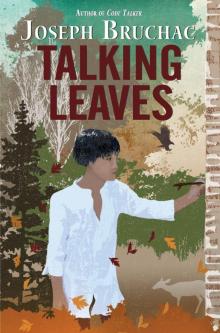 Talking Leaves
Talking Leaves Found
Found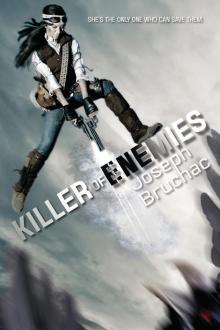 Killer of Enemies
Killer of Enemies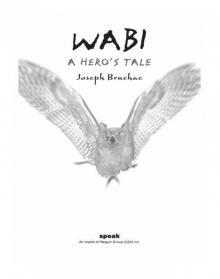 Wabi
Wabi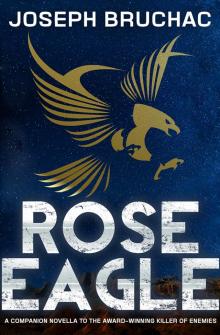 Rose Eagle
Rose Eagle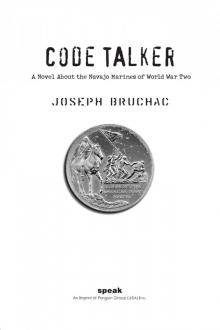 Code Talker
Code Talker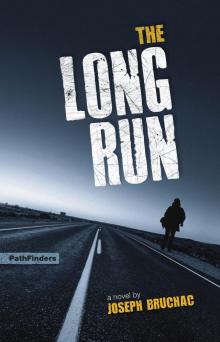 The Long Run
The Long Run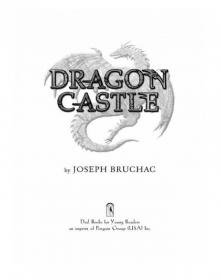 Dragon Castle
Dragon Castle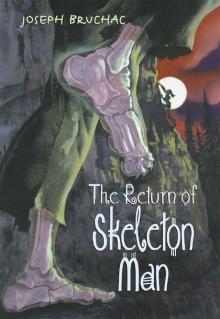 The Return of Skeleton Man
The Return of Skeleton Man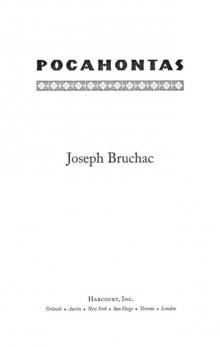 Pocahontas
Pocahontas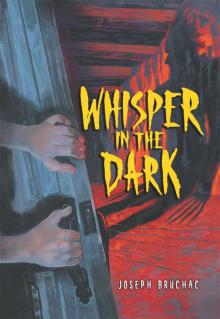 Whisper in the Dark
Whisper in the Dark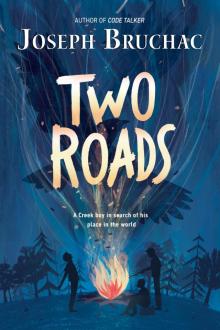 Two Roads
Two Roads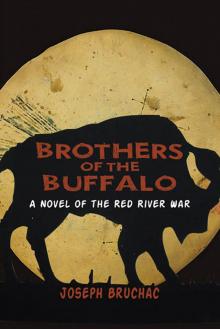 Brothers of the Buffalo
Brothers of the Buffalo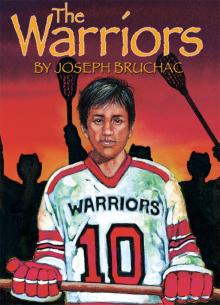 The Warriors
The Warriors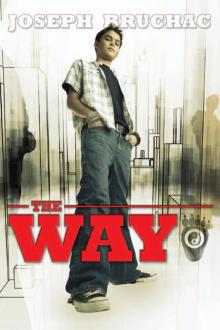 The Way
The Way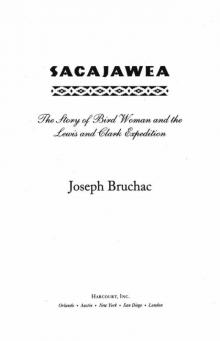 Sacajawea
Sacajawea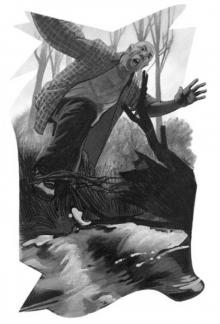 Night Wings
Night Wings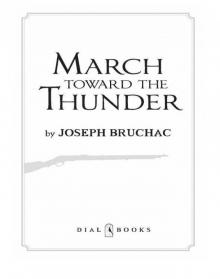 March Toward the Thunder
March Toward the Thunder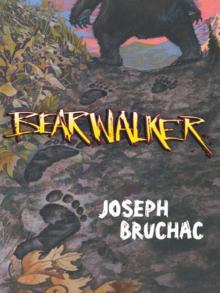 Bearwalker
Bearwalker Skeleton Man
Skeleton Man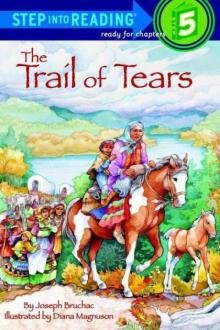 The Trail of Tears
The Trail of Tears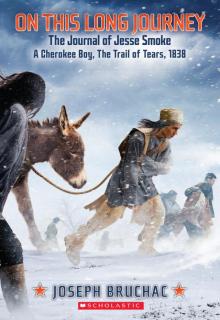 On This Long Journey
On This Long Journey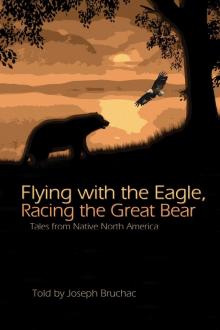 Flying with the Eagle, Racing the Great Bear
Flying with the Eagle, Racing the Great Bear